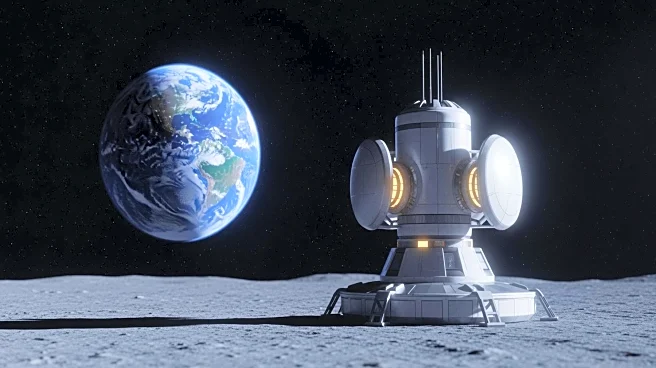What's Happening?
NASA has announced plans to deploy a nuclear reactor on the Moon by 2030, marking a significant step in the new space race involving the United States, China, and Russia. The initiative, led by acting
director Sean Duffy, aims to establish a fully operational reactor on the lunar surface by the end of the decade. This development comes as China and Russia have signed an agreement to build a joint nuclear energy facility on the Moon by 2035, as part of the International Lunar Research Station project. The Moon's south pole, rich in water ice, is a prime target for these projects, as it offers potential resources for sustaining human life and fueling rockets. NASA's project has transitioned from a government-only initiative to one involving commercial partners, which could accelerate development and open new economic opportunities.
Why It's Important?
The deployment of a nuclear reactor on the Moon could have profound implications for space exploration and geopolitical dynamics. The involvement of commercial partners in NASA's project suggests a shift towards market-driven strategies, potentially leading to faster and more cost-effective solutions. This could create new markets in the space industry, including energy systems and lunar infrastructure. However, the project also raises significant legal and safety concerns. The 1967 Outer Space Treaty prohibits territorial claims and weapons of mass destruction on the Moon, but does not explicitly ban nuclear energy, creating a legal gray area. The establishment of 'exclusion zones' for safety could lead to de facto territorial control, intensifying competition among space-faring nations.
What's Next?
As NASA progresses with its lunar nuclear reactor project, the next decade will be crucial in determining whether major powers will collaborate or compete for strategic infrastructure on the Moon. The potential establishment of exclusion zones by China and Russia could prevent other nations from accessing key lunar areas, particularly the south pole. This could lead to increased geopolitical tensions and necessitate new international agreements to manage lunar resources and activities. The success of NASA's project will depend on managing technical and legal challenges, including the safe transport of nuclear materials and compliance with international space law.
Beyond the Headlines
The development of nuclear power on the Moon could redefine humanity's approach to space exploration, shifting from short-term missions to sustainable, long-term presence. This could pave the way for further exploration of Mars and beyond, with the Moon serving as a 'gas station' for rockets. However, the ethical implications of nuclear energy in space, including environmental risks and the potential for militarization, must be carefully considered. The outcome of this new space race could influence global power dynamics and the future of international cooperation in space.











